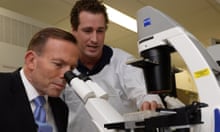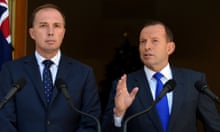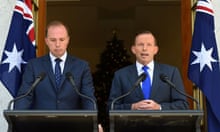Tony Abbott has backed away from the budget policy to introduce a $7 co-payment on GP visits, announcing exemptions for children, pensioners and veterans.
The prime minister said after a cabinet meeting in Canberra on Tuesday the government would proceed with a revised policy that would allow GPs to charge an “optional” $5 fee for adults who did not hold concession cards.
The government would reduce the Medicare rebate paid to providers by $5 for non-concession card holders from July next year, and it would be up to the provider to decide whether to recoup the money from patients. Some doctors accused the Coalition of shifting the blame for the policy to GPs.
Abbott said there would be “no change to bulk-billing for children under 16, for pensioners, for veterans, for people in nursing homes and other aged care institutions”.
“For some time I’ve had backbenchers coming to me, I’ve had members of the community coming to me saying, ‘We support the idea of more price signals in the system, that’s an economic reform, but can’t it be better for children and for pensioners?’ That’s exactly what [health minister] Peter Dutton and I are announcing today,” he said.
Dutton said the government was also scrapping its original plan to introduce a co-payment on pathology and diagnostic imaging services
“I believe very strongly that this has a strong level of balance and equity,” Dutton said of the new package.
The government has also announced it will make changes to encourage doctors to spend more time with patients. Currently the same Medicare rebate is available for a six-minute consultation as a 19-minute consultation, according to a government fact sheet.
New time requirements will apply from 19 January 2015, with consultations that take less than 10 minutes attracting a lower Medicare rebate.
The plan will require legislation and regulation. Parliament will be asked to pass legislation enabling doctors to charge $5 and receive the Medicare rebate directly, rather than forcing patients to pay the whole amount and then claim reimbursement.
Abbott said changes to rebates required regulation, which a minister could impose but the Senate could vote to strike down. The prime minister said the government had addressed the crossbenchers’ principal concerns so “it would be most surprising if the parliament were to take the rather extreme step of disallowing a Medicare regulation”.
“I’m very confident that these regulatory changes will stand because I believe that the change to the rebate, change to the times of consultations is a quality control measure,” he said.
It is understood Labor will consider whether to support two elements of the plan: the changes to timing on GP consultations and freezing the rebate until 2018.
The opposition leader, Bill Shorten, indicated Labor would continue to oppose the overarching “GP tax” policy, which he said was being implemented in a sneaky manner and through the back door.
“[Abbott] may have changed his talking points, but he hasn’t changed what he really wants to do to Medicare, which is to wreck it,” Shorten said.
Labor’s health spokeswoman, Catherine King, said: “We welcome the concessions that the government has been forced to make after 12 months of uncertainty in the healthcare sector … but this still is a fundamental attack on Medicare.”
The Greens said they would move a disallowance motion against the changes at the first available opportunity after the resumption of parliament next year.
“After spending the best part of a year failing to win parliamentary support for its co-payment the Abbott government is now trying to slash payments to doctors so that they are forced to do the government’s dirty work,” the Greens senator Richard Di Natale said.
The Palmer United party leader, Clive Palmer, said Abbott had succumbed to pressure from the PUP to dump the co-payment policy.
“The co-payment is dead and this is a victory for the Palmer United party,” Palmer said. “Low income earners, single parent families, pensioners, nursing home patients and those who are socially or financially disadvantaged were to be hardest hit by this disastrous policy.”
The independent senator Nick Xenophon said it was a passive aggressive backdown, which still meant GPs got paid less or patients had to pay more. He also predicted it would result in an administrative nightmare.
A fellow independent senator, Jacqui Lambie, said she would review the detail but the proposal should be “viewed with suspicion” because Abbott had “no respect for the universal nature of Medicare”. The Family First senator Bob Day said the concessions were “a step in the right direction”.
The Liberal Democratic senator David Leyonhjelm backed the changes, but said he was disappointed the funds would still be directed to the medical research future fund. “The prime minister’s announcement is something of a cunning stunt, but it’s a good one,” he said.
The Australian Medical Association, a vocal critic of the original plan, welcomed the extra protections but raised strong concerns about the decision to cut and freeze the Medicare rebate until 2018.
The president of the Doctors Reform Society, Dr Con Costa, said the new scheme was an “attack on bulk-billing” and a “cynical shifting of blame on to doctors for a policy that had been roundly criticised”.
Abbott refused to rule out a Medicare-related advertising campaign, having launched one on Sunday aimed at easing concerns about proposed changes to higher education.
The original policy, spelled out in the May budget, required legislation to adjust bulk billing incentives. That would have been achieved by reducing the Medicare rebate by $5 and allowing the provider to collect $7 per service.
The proposal was one of the most unpopular elements of the government’s first budget and was considered unlikely to pass the Senate. It was due to begin in July 2015, but the government never presented legislation to parliament to implement it.
The co-payment, applying to GP visits and out-of-hospital pathology and diagnostic imaging services, would have raised $3.5bn over five years for the new medical research future fund.
Abbott said the new plan would raise almost the same amount of money as the original budget plan, with Medicare rebates to be frozen over the next four years. He said the government would proceed with the “absolutely vital” medical research fund.
Tuesday’s announcement followed mixed messages towards the end of the parliamentary year over the future of the co-payment. The government ended the year lagging in the polls and Abbott told colleagues he wanted to remove several “barnacles” before Christmas.



Comments (…)
Sign in or create your Guardian account to join the discussion